The spring water at Klaver Flowers' farm in Ethiopia is abundant but contains a lot of sodium and bicarbonate. To get the EC down, the grower, therefore, uses osmosis technology, which is effective but also has a price tag.
When Hortus Supplies International (HSI BV) proposed to start a practical trial with an Aqua4D water improvement system in collaboration with Aqua4D-Lescrauwaet BV, owner Gert-Jan Klaver initially reacted somewhat skeptically but also curiously. "If it doesn't help, then it doesn't hurt. We had seen good results elsewhere in roses and vegetables, so I was keen to try it."
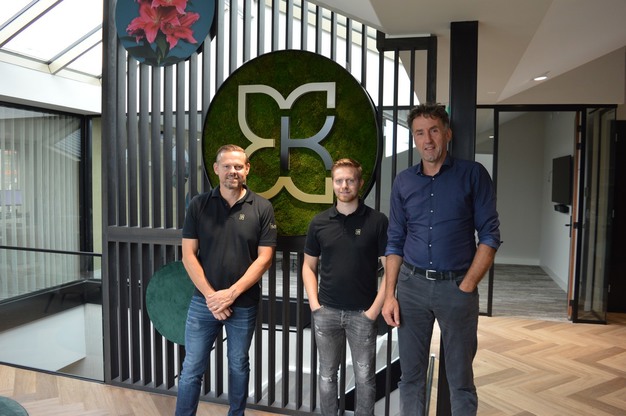
From left to right Gert-Jan Klaver, Jesse Bergsma and Raymond Lescrauwaet.
10% water savings
Immediate results after starting an initial trial in part of the crop were substantial water savings. This, it later turned out, could vary greatly according to the changing weather conditions but came out at around 10% on average. That also meant a 10% saving on fertilizer use, and as the company has grown considerably in recent years - now growing mainly gypsophila and limonium on some 50 ha - that is a nice bonus.
In addition, soil moisture, which is important for good root system formation, is significantly more even. "We grow the flowers on beds," Gert-Jan says over a cup of coffee in the brand-new office at the farm in Heerhugowaard, "and a good distribution of water is very important here. Previously, the water sank down in a cone shape, the horizontal distribution left much to be desired. Moreover, with a lot of side radiation, we often saw the sides of the beds drying out. We also see now that, especially with the gypsophila, the roots are less salt-sensitive."
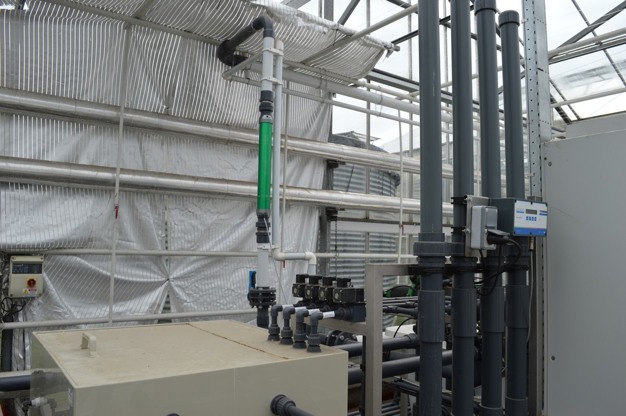
The Aqua4D system is installed in the main line.
Resonate
With Aqua4D technology, the molecular structure of the water improves through a resonance technique developed in Switzerland based on electromagnetic signals. The water structure refines, fluidity or surface tension improves, the effect of bicarbonate is reduced, and the water absorbs nutrients better and, together with the nutrients, is easily absorbed by plants.
It is therefore not surprising - or indeed, it is to be expected - that the plant above ground also benefits. "We would like to achieve above-average quality, the stems are preferably all 80 cm and weigh at least 30-35 grams. To achieve that, everything has to be right, and since we started Aqua4D, we are indeed seeing slightly longer and slightly heavier stems. In addition, the soil structure is looser, and we see a bit less sunburn on the leaves."
As in Ethiopia, in Heerhugowaard
More or less in sync with the field tests in Ethiopia, an Aqua4D rental trial was also started in the greenhouses in Heerhugowaard. This is admittedly a completely different crop (lilies, in crates, under glass) and under completely different climatic weather conditions, but where things like savings and quality improvement are concerned, optimization is also on the cards here.
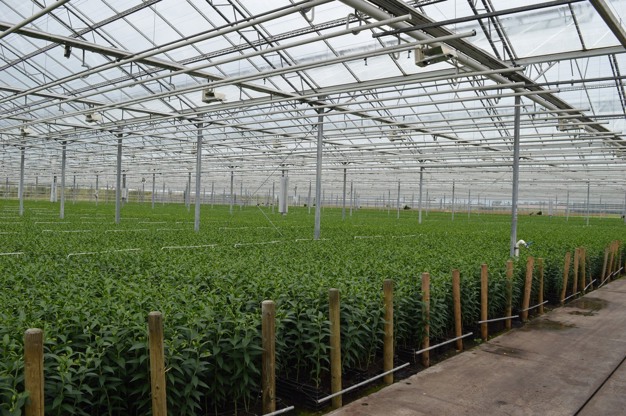
A look inside the greenhouse.
The initial findings proved almost identical: a 10% saving on water, a more even moisture distribution, better crop flow, and, especially in winter, the crop dries considerably faster. Moreover, Gert-Jan and cultivation manager Jesse Bergsma note that the pipes have become cleaner: there is less deposit in the pipes, and filters also need to be replaced less often.
Plug & play
After a thorough preliminary process, the Aqua4D system is 'plug & play', it is installed in the main pipeline, and then they don't have to worry about it for years. At the growing location, after an initial unit used to irrigate 3 ha, three units have now been installed to supply the entire farm, about 14 ha of production, with irrigation water. "This number is not primarily correlated to the amount of water flowing through the Aqua4D treatment tube, but more of the entire water column itself because it also has its effect in stagnant water," explains Raymond Lescrauwaet of the Hilversum-based Aqua4D-Lescrauwaet, which has now been importing for 12 years.
"The art of the technology is to find the precise resonant frequencies of the water while counteracting any outside interference as much as possible. That is why we take all kinds of environmental measurements beforehand at various points in the greenhouse, especially where water or power lines run or, as in this case, there is a high-voltage mast nearby. If you have all that insight, then basically all water that is in that particular (greenhouse) circuit is treated to the maximum."
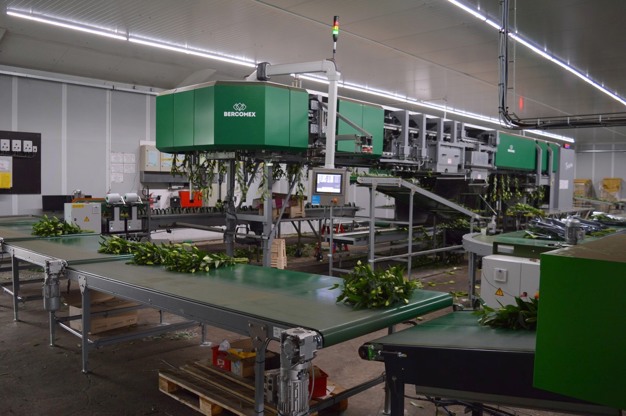
Flowers are scanned, cut, and bunched.
Looking ahead and being able to accurately pinpoint the differences between Aqua4D treated and untreated (reference) boxes often also says something about the expertise and commitment of the grower in question, Raymond adds. "At Klaver Flowers, in addition to a progressive and approachable management team, that's absolutely right with motivated cultivation managers like (former) Rob, Danny, and Jesse."
Looking ahead
The men are quite pleased with the findings: Klaver Flowers with the investment/savings and the heavier quality of the flowers and Aqua4D-Lescrauwaet with a magnificence of a reference in both Heerhugowaard and distant Ethiopia, with thanks to Jack van Winden of export partner HSI BV.
"It's not magic," concludes Gert-Jan, "we measure consistently and observe clear improvements. We hope to further expand our farm in Ethiopia in the near future, and with today's knowledge, that will definitely include an Aqua4D system."
For more information:
Klaver Flowers 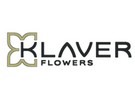
Rustenburgerweg 209
1703 RV, Heerhugowaard
Tel.: +31 (0) 725710433
[email protected]
https://klaverflowers.com/
Aqua4D-Lescrauwaet BV 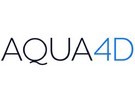
Graaf Florislaan 40
1217KM, Hilversum
Tel.: +31 (0) 35-8872683
[email protected]
https://www.aqua4d-lescrauwaet.nl










